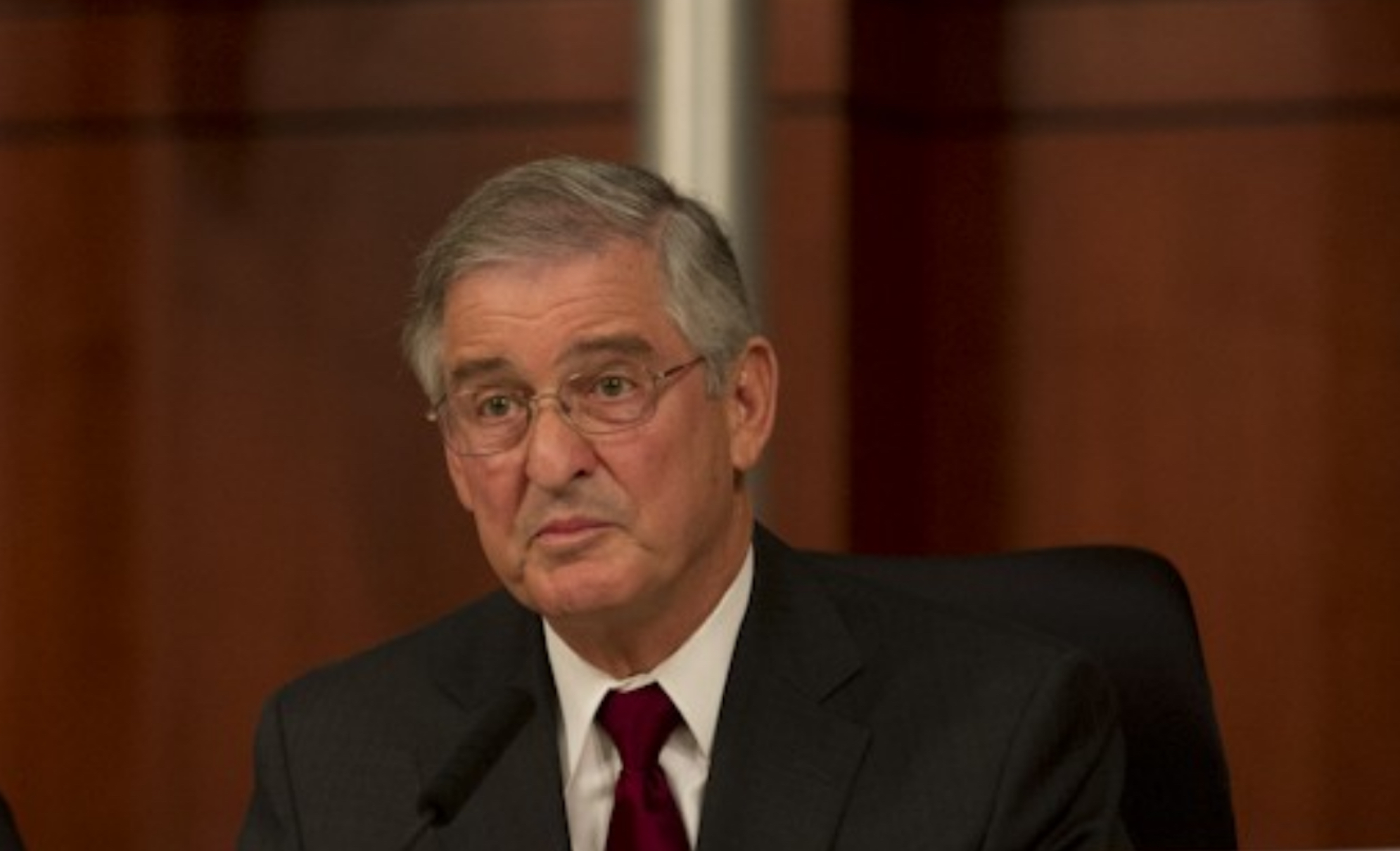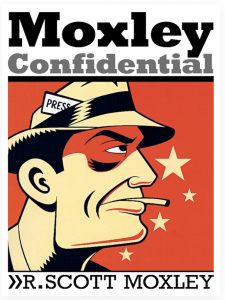
In January 2008, Larry Agran—the leader of a three-council-member, Democratic alliance that controlled the city of Irvine for more than half a decade—desperately needed to enlist outside professional help to manage what had spiraled out of control: plans to build the Orange County Great Park, then one of California’s largest public-works projects.
But there was a problem.
Agran, a career politician who had no clue how to build a massive public park despite his promises otherwise, didn’t just crave a competent CEO for the $1.6 billion project. The county’s living liberal icon with frightening Nixonian tendencies hoped the park would be an unbreakable monument to his legacy, so he needed someone who would obey his wishes, no matter how ridiculous or shady.
Excluding the four other elected representatives on the council, as well as the other eight members of the Great Park’s Board of Directors, Agran met Mike Ellzey at an Irvine Denny’s off the 5 freeway on Sand Canyon Avenue.
Ellzey’s background with private corporations, at a university and as CEO of the Golden Gate Park Concourse Authority made him a suitable candidate for the Great Park job. Demonstrating his dictatorial sensibilities that allowed him to dismiss the participation of his colleagues, Agran unilaterally offered Ellzey a taxpayer-funded job worth more than $175,000 annually.
Of course, there was a catch.
The CEO job would remain vacant. Ellzey was invited to take a government post that Agran conjured up on the spot: deputy CEO. Irvine’s top Democrat wanted to see how far he could trust the city’s newest employee.
As I’d reported in detail for years before this secret Denny’s powwow, Agran’s public pronouncements about alleged strides in developing the Great Park had been a sham masking brazen shenanigans. Paranoid of the public learning more about his antics, he watched Ellzey for six months and—satisfied he could control him—elevated the outsider to the CEO post.
Yet, given this was Agran’s world—a theater of endless, conniving plots that would impress Shakespeare—Ellzey quietly learned he’d become CEO of nothing. He didn’t really answer to the Great Park board or the City Council. He answered to Agran and two Great Park subcontractors: Arnold Forde (of Forde and Mollrich) and Yehudi Gaffen (of Gafcon Inc.), two of the Democrat’s pals who’ve taken millions of dollars in diverted park funds for no-bid, consulting contracts.
In a sworn, June 18 deposition made public on July 21 as part of a probe into why Agran and his political allies spent $200 million in park funds with very little to show, Ellzey talked about his first realization something was terribly wrong in Irvine.
Scanning budget items when he took the job in 2008, he saw that Forde, Agran’s chief political consultant, was receiving a $100,000-per-month retainer, allegedly to do public relations for a park that didn’t exist.
“I remember as though it was yesterday,” he told Anthony R. Taylor, the private attorney representing the city in its probe of the Great Park. Shocked, Ellzey approached two veteran Great Park managers and asked, “‘What is this $100,000 a month for Forde and Mollrich?’ And they told me it was for public relations. And I said, ‘We’ve got to reduce that. I mean, that’s way too much.'”
The response was memorable.
“And they literally laughed,” said Ellzey. “I asked them, ‘Why are you laughing?’ [They replied], ‘Good luck on that.'”
Frustration mounted.
“I didn’t know at the time, but here I was, new guy coming in, starting to make changes because it was now my shop, and one of the things I wanted to change was how could we possibly be using $100,000 a month for public relations?” Ellzey testified.
When other experienced consultants offered to take the Forde and Mollrich monthly contract for $15,000, Ellzey tried to get Agran, Councilwoman Beth Krom—Agran’s whiny, robotic sidekick—and Forde to downsize the deal, but even his suggestion to lower the contract to $50,000 per month met seething anger.
“And so I knew exactly how, how strong and powerful Forde and Mollrich were,” Ellzey said. “How connected they were to Larry Agran and how powerful Larry Agran was as an individual, and don’t even think of messing with it because you will get smothered if you even try.”

It also weighed on Ellzey that, though a brilliant strategist, Forde acted like a “Mafioso” and “threatened to come after [his job],” according to Taylor’s deposition transcript.
During regular city hearings, Ellzey says, he “was [repeatedly] put in a position of publicly justifying a $100,000 a month” deal, which he called “low points for me as a public executive.”
He recalled during Taylor’s inquiry, “If pressed, I could never justify that [Forde and Mollrich] brought that much value. . . . So, somebody was making a lot of money.”
Agran’s Democratic machine, slyly renamed “The Great Park Team,” couldn’t operate in such a fashion unless the voters of Irvine ignorantly kept it in power, and Ellzey’s bombshell deposition sheds new, insider light on that scam.
Instead of focusing on building the Great Park they’d promised, Agran and Forde regularly manipulated the park’s budget and schedule to trick voters into a false sense of security. “The project team was also under extreme pressure to deliver projects in advance of Irvine’s elections,” testified Ellzey. “Project scopes were designed and scheduled to be completed in advance of the bi-annual elections, and Arnold Forde was the enforcer of these project dynamics, and Yehudi Gaffen was the implementer of the program.”
The dubious election scheme had a second, self-serving component. Theoretically, the Great Park belongs to the citizens of Orange County, but Ellzey explained that Agran raided the park’s funds for his political campaigns. Expensive, glossy, taxpayer-funded mailers touting alleged park progress were timed for distribution two months prior to crucial council elections and sent only to Irvine residents.
Other park spending is steeped purposefully in mystery. Observing suspicious financial irregularities, Ellzey asked government contractors to comply with the contracts and reveal expense documentation. But those contractors, all Agran buddies, replied, “Shove it,” he recalled.
In addition, there was gross negligence. Ellzey said the park design plan cost taxpayers more than $42 million—$42 million!—and never had a chance for implementation because Agran’s feasibility studies were “terrible.” Ellzey called the design “a waste,” noting that the concept—absurdly loaded with man-made canyons, lakes and waterfalls—was created without appreciation of government financial constraints. “It was more of a master plan design that was magnificent as opposed to a relationship to what was constructable,” he said.
“Larry was the classic surround yourself with yes men, yes people,” Ellzey testified. “And he would walk around and do a tour, and he would have an entourage of eight or 10 or 12 people with clipboards, and [they’d be] writing down notes of everything he said.”
Taylor—one of the lawyers who represented Bell residents in the recovery of public funds diverted to that city’s council members and bureaucrats for outrageous compensation packages—is expected to issue a final report in coming months.
Agran, Krom and their allies, who lost control of the city in 2012, are hoping voters ignore their park fiasco and return them to power in the November elections.

CNN-featured investigative reporter R. Scott Moxley has won Journalist of the Year honors at the Los Angeles Press Club; been named Distinguished Journalist of the Year by the LA Society of Professional Journalists; obtained one of the last exclusive prison interviews with Charles Manson disciple Susan Atkins; won inclusion in Jeffrey Toobin’s The Best American Crime Reporting for his coverage of a white supremacist’s senseless murder of a beloved Vietnamese refugee; launched multi-year probes that resulted in the FBI arrests and convictions of the top three ranking members of the Orange County Sheriff’s Department; and gained praise from New York Times Magazine writers for his “herculean job” exposing entrenched Southern California law enforcement corruption.

